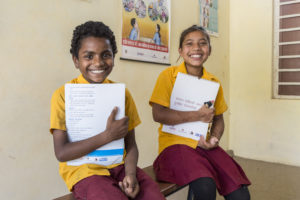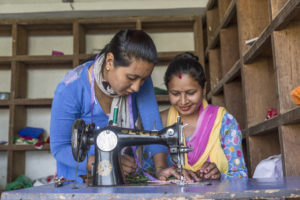Child laborers in Nepal often work in hazardous conditions, are exposed to extreme environmental conditions, deadly chemicals, and suffer sexual, physical and emotional abuse. As a result, many children are prevented from obtaining quality education and a gateway to a better life.
World Education has led Nepal’s largest programs to address child labor and trafficking over the last 15 years, providing comprehensive, multi-faceted, and practical solutions to the diverse causes, forms, and detrimental impacts of these injustices.
World Education began its work in this area by providing direct services to trafficked children and, over time, expanded to include a focus on prevention as well. Recent direct-service efforts have focused on the brick industry, the sari (embroidery) industry, commercial sexual exploitation in the adult entertainment industry, exploitative foreign employment, and children whose families are trapped in bonded labor. World Education and partners work to remove children from exploitative situations and provide education in the form of bridging courses, coaching, and non-formal programs. In addition, World Education works with families and home communities to develop livelihoods, increase awareness, and reduce vulnerability so that fewer families and children fall into exploitative situations in the future.
Beyond working directly with the most at-risk communities, World Education works on a broader level to strengthen the government’s capacity to address child labor issues and increase public knowledge on child labor-related issues. As a member of the Inter-Agency Working Groups for Trafficking, Child Labor, and Child Protection in Nepal, World Education is involved in the overall coordination of anti-trafficking and anti-child labor strategy between local NGOs and the government. Further, World Education has successfully embedded child labor and trafficking prevention messages in the school curricula and mobilized teachers to provide critical information to young people all across Nepal.

Rohit Kumar Kandu and Urmila Sunar from Shree Shiwapuri Lower Secondary School hold materials that inform them about the dangers of foreign employment and migration in their school.
Children in Danger in the Brick Industry
Nepal’s brick industry employs an estimated 29,000 children working in hazardous conditions where dust and smoke permanently damage lungs and carrying excessive loads of bricks in searing heat damages their bodies for life.
For out-of-school children laboring in the brick industry, World Education offers tailored coaching and programs that teach basic literacy, numeracy, and health knowledge. These programs support children to transition back into the formal school system and enable children whose families work in the brick industry to continue learning despite interruptions in their schooling.
For older youth, World Education bridges the gap between what is taught in- and out-of-school and the skills necessary for employment with training programs and curricula that equip young people with meaningful employment skills reflecting their social, cultural, and economic realities. For example, World Education programs provide career counseling, vocational training, and occupational safety and health (OSH) courses for older youth in the brick industry.
Recognizing the critical role that mothers play in ensuring children’s educational success, World Education often incorporates mothers’ literacy and self-employment classes into initiatives targeting working children. As a result, mothers become more engaged in their children’s learning process and are better able to support their family economically, ensuring that World Education’s investments have long-term impact.
New Starts for Trafficking Survivors

Anita Dangol, 26 years, received entrepreneurship training as well as skill training. She opened a grocery store in Kanchanpur and now she started her own tailoring shop where she gives training as well.
World Education partners with NGOs with experience identifying and accessing trafficking victims. World Education works with partners to find ways of using education interventions to complement psycho-social care, health, and legal services for more effective reintegration of trafficking survivors. Partners provide services to trafficking survivors who exploited in the commercial sex industry, hazardous child labor in the brick and sari industries, and international labor migrants trafficked into exploitative labor.
Successful strategies incorporate nonformal education, scholarships, and support to return to school, vocational skill training, financial literacy, and entrepreneurship depending on the age and circumstances of the survivor. Ongoing engagement with trafficking victims helps World Education and its partners understand evolving trends in trafficking and to tailor prevention efforts in response.
After the April 2015 earthquake, vulnerability increased in trafficking prone communities and for youth who were displaced. At-risk youth benefit from self-employment classes that develop entrepreneurship and small business management skills. Rebuilding community support systems such as women’s microfinance groups also helps increase community resilience to traffickers.
